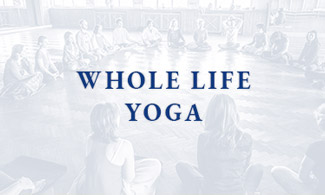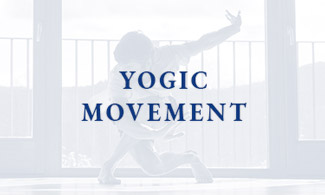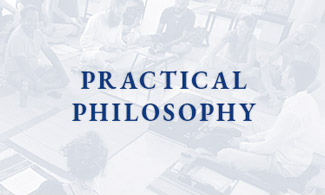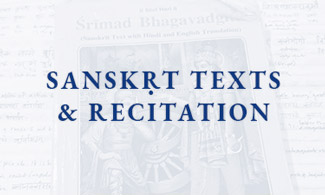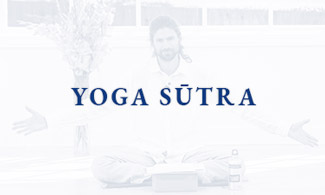
Practical Bhakti
Bhakti yoga is the yoga of devotion. It is associated with practices of singing, dancing, with selfless service, with the dedication of one’s actions to that which one considers the highest, with the consecration of everything we do.
The word bhakti is from the root bhaj, which means to ‘approach with reverence’.
Bhakti plays a central and foundational role in the yoga method.
Bhakti, together with jñāna and karma, form the three principal mārga-s, or ‘ways’ of cultivating and revealing yoga.
Sometimes, people misperceive this and think that one can choose a path: the karma path for the active, socially minded; the way of jñāna for the person of inquiring, intellectual, reflective and meditative persuasion; and bhakti for those of devotional proclivity. Or: karma for the active-pragmatic, jñāna for the intellectual, bhakti for the emotional.
However, these three ways can also be seen as the interwoven, mutually supportive and enabling foundations of the ‘one true way’ of yoga, that is, the all-inclusive way that invites the whole human being into oneness.
I would say that we will be hard pressed to come to any degree of realisation without a good degree of bhakti.
For example, I have a friend, Bill, a former US Marine Captain. In Vietnam, Bill experienced all manner of horror, and it had a deep effect on his life. Decades later, Bill told me that it was the study of philosophy that saved him and helped him to continue a sustaining inquiry into meaning and reality in the wake of the soul shaking, life changing experiences he lived during the Vietnam war: the horrors and privations, and the extraordinary love and comradeship he had experienced on the exacting field of examination that is the high-stakes arena of battle.
When I met Bill, we were both teaching English at the same university in Thailand. At that point, Bill had already been translating Confucius with one of his Chinese colleagues for more than twenty years, and had been translating Japanese Zen texts and Thai Buddhist texts with colleagues from those departments for years, all while tutoring students in some of the Greek and Latin classics. In the more recent years though, Bill had got to the language and the text that had long fascinated him, with its most celebrated philosophical treatise delivered in poetry of jaw-dropping beauty and perennial acuity – on the battlefield. Bill had started studying Sanskrit with another senior faculty member from the Sanskrit department. After some formative years to gain some familiarity with the grammatical foundations, Bill’s Sanskrit master had granted that they begin work on the Bhagavad Gītā. Bill was thrilled.
Often when he was working on this text, Bill would comment to me on the soul-shaking beauty of the verses, on the potency of Kṛṣṇa’s teachings, and on the unmistakable ‘rasa’ or flavour of the battlefield that the opening chapter evokes, and how that brings a man into the present moment like nothing else.
As Bill was advancing through the text, he got to the twelfth chapter, devoted to bhakti yoga, the yoga of devotion, in which Kṛṣṇa also describes the devotee who is dear to him. When I called in on Bill in his office, he straightaway commented on the beauty of the verses, but then went on to say:
‘But I have a problem James… ‘
Now Bill knows that I like to sing ‘kīrtan’, that I enjoy some of the practices that are immediately associated with bhakti yoga…
‘I just don’t have a bhakti bone in my body.’
This did not land very convincingly with me. I knew the tenor of Bill’s days. He would rise at 4 o’clock (‘Well I was a Marine, what other time is there to get up?’) and go for his morning walk, during which he will do 100 push ups (‘I’m a Marine, I learnt certain habits’).
And after this start to the morning, Bill will spend most of his day studying wisdom texts, otherwise teaching language, as a means to facilitate more effective communication, in other words as a means to facilitate more penetrating and revealing inquiry, to peel away, as Bill would put it, his highly practised and refined capacity to delude himself; in his ex-Marine’s lexicon: his inestimable capacity to mindf*** himself.
So I said to Bill,
‘How can you say that? How do you spend your days if not soaked in devotion? Is your whole day not devoted to your search for truth, to come out of the mindf***? If you were not dripping in bhakti, I don’t see how you would possibly be able to do what you do every day.’
And Bill said.
‘You know what James, I went to see one of my monk friends the other day, and he said the exact same thing.’
Now Bill himself had pointed out to me, earlier in his work with the Gītā, how he knew first hand the difference between habits and discipline. He owned quite openly that the getting up at 4 o’clock, the walk with the hundred push-ups, and the always carrying his wallet in a waterproof plastic wrapping (‘A Marine is prepared’) were not so much ‘discipline’, just well-established habits, known in Saṃskṛt as ‘saṃskāra-s’: ways of operating that are well-formed, well-made, well-established. (Just as Saṃskṛt refers to the language that is well-structured, well-codified, well-arranged, well-ordered, well-made, so saṃskāra – another form of the same word – refers to a habit that is well-made, well-established. Well-formed.)
However, Bill had also owned that the commitment to keep exploring, to keep inquiring, to not settle, but to keep fathoming the depths of one’s almost – as one keeps looking – unbelievable capacity for self-delusion, for willful blindness, for tricky, refined, polished mind-f***ing, well, that takes real discipline. That requires courage and commitment. Other things that Bill learnt from his years of service.
The fact is that real practice, on any particular personal path requires courage, heartfulness, requires devotion to the cause. It is so easy to settle into the ways of denial, delusion, of wilful blinkeredness. A practitioner needs qualities of a warrior. But a warrior needs love to stay true to the cause when the real duress comes.
From the outside, Bill’s path might have seemed like one of jñāna, of the intellect. He was spending time at his desk, in searching conversation and applied effort with other ’students’ who were also Professors. He was thinking, reflecting, re-formulating. However, how could he have continued his efforts without devotion, without bhakti? For Bill, his inquiry into Truth was his ‘Highest’ and it was to this that he was dedicating his efforts. His ‘Highest’ or ‘God’ might have taken a different ‘form’ from that which people more typically think of, but his devotion to it was real and sincere, illustrated irrefutably by the way he dedicated the currency of his life force.
Sometimes people think that one can just do karma yoga. ‘What’s the point of this meditation and study (jñāna), of this singing and dancing (bhakti) when there are people hungry? When there are bridges and schools to be built? But again, how can one work effectively, efficiently without inquiry and attention (jñāna) and without dedication, commitment and devotion (bhakti)?
As so often in modern times, I feel that people often reduce the meaning of terms, wanting the security of compartmentalisation and of easy ‘tick-box’ assigning of big concepts to convenient and non-threatening little boxes. This is particularly problematic when it comes to yoga. Because yoga is about coming out of all limitations, freeing ourselves from all limiting beliefs and ideas.
Consequently, genuine yoga practice demands that we go into the unknown. Yoga practice can only begin, or proceed, when we own that we do not know. The delusion and self-deception of ‘I know’ will block it. The slavish ‘believing’ of ideas, theories, systems – scientific or otherwise – will block real practice. The way of yoga is to wilfully step into the unknown, honestly, with our awareness and our discernment as our companions. Whether we are of the intellectual (jñāna) or practical persuasion, this is impossible without bhakti, without heartfulness, and courage. Only with bhakti can we approach our activity and our inquiry with the attitude of reverent presence that will most empower it.
There can be no practice without bhakti. It is the enabler of karma and jñāna.
Similarly, there can be no practice without karma, the action that enables bhakti and jñāna; and there can be no practice without jñāna, the attentive inquiry that enables and checks that our karma and bhakti are actually inviting a deepening of yoga.
The way of yoga is the way of the whole human being. Yoga includes.
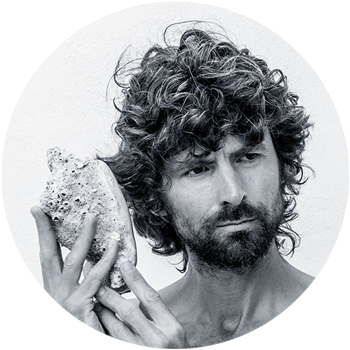
James Boag | Whole Life Yoga
The yoga of the whole human being. Practical philosophy, storytelling, movement, inquiry, looking in ways that reach beyond our habitual ways of looking.
Listen to James’ unique whole life yoga perspectives on the WHOLE LIFE YOGA podcast.

